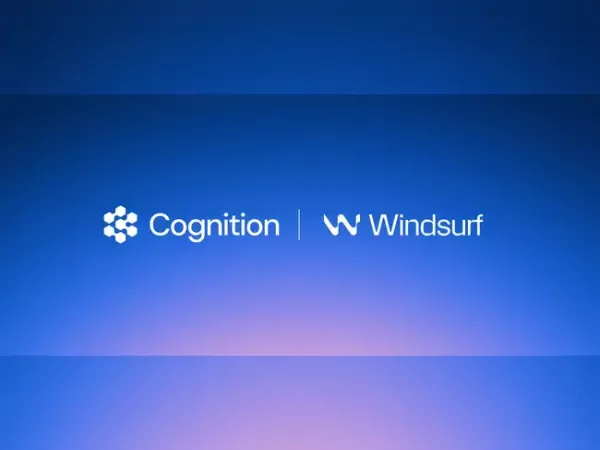Cognition AI, an artificial intelligence startup that offers a software coding assistant, said Monday that it had bought rival Windsurf as part of an escalating battle to lead in the technology.
The move follows a $2.4 billion deal by Google to acquire some of Windsurf's top executives and license the startup's technology, which was revealed Friday. Google's deal appeared to leave Windsurf in a difficult position as a stand-alone startup. OpenAI, the maker of the ChatGPT chatbot, had also been in talks to buy Windsurf before the Google deal.
"We've long admired the Windsurf team and what they've built," Scott Wu, a co-founder of Cognition, said in an email to employees viewed by The New York Times. "Within our lifetime, engineers will go from bricklayers to architects, focusing on the creativity of designing systems rather than the manual labor of putting them together."
The price of the deal could not immediately be learned.
Cognition's move comes amid a flurry of activity by Meta, Google and OpenAI, which are racing against one another to scoop up a small pool of top technology talent in an increasingly competitive space.
Unlike the acquisition sprees that big tech companies previously embarked on, the giants are structuring these deals in an unusual way, often positioning them as investments instead of outright purchases.
In June, Meta invested $14.3 billion in the startup Scale AI to hire some of Scale's top executives and to expand a commercial agreement. Last year, Google invested $3 billion in another startup, Character AI, in exchange for talent and technology. Amazon made a similar move with Adept, another AI company, about a year ago.
Some critics have questioned whether the deals have been structured this way to avoid antitrust concerns from regulators and whether employees who are left behind at the startups are being given short shrift.
Over the weekend, Windsurf's founders, who said they would leave the company as part of Google's investment, were criticized after it appeared that some of their employees would not see similar paydays as colleagues who were leaving to join Google.
Cognition, which offers an AI coding assistant called Devin to help software developers create programs, said its deal would allow all Windsurf employees to participate in financial gain, according to a letter sent to Windsurf employees. Windsurf employees with equity will receive an "accelerated vesting" schedule, which means their stock can be cashed in earlier than anticipated, according to the letter. Those who do not have stock in the company will also be given vested shares based on their time working at the company.
After the Google deal was announced, Windsurf executives worked over the weekend to structure a sale to Cognition, two people familiar with the discussions said. Windsurf had multiple suitors, the people said, but Cognition offered the strongest terms and a deal that would provide bigger benefits to all employees.
The move follows a $2.4 billion deal by Google to acquire some of Windsurf's top executives and license the startup's technology, which was revealed Friday. Google's deal appeared to leave Windsurf in a difficult position as a stand-alone startup. OpenAI, the maker of the ChatGPT chatbot, had also been in talks to buy Windsurf before the Google deal.
"We've long admired the Windsurf team and what they've built," Scott Wu, a co-founder of Cognition, said in an email to employees viewed by The New York Times. "Within our lifetime, engineers will go from bricklayers to architects, focusing on the creativity of designing systems rather than the manual labor of putting them together."
The price of the deal could not immediately be learned.
Cognition's move comes amid a flurry of activity by Meta, Google and OpenAI, which are racing against one another to scoop up a small pool of top technology talent in an increasingly competitive space.
Unlike the acquisition sprees that big tech companies previously embarked on, the giants are structuring these deals in an unusual way, often positioning them as investments instead of outright purchases.
In June, Meta invested $14.3 billion in the startup Scale AI to hire some of Scale's top executives and to expand a commercial agreement. Last year, Google invested $3 billion in another startup, Character AI, in exchange for talent and technology. Amazon made a similar move with Adept, another AI company, about a year ago.
Some critics have questioned whether the deals have been structured this way to avoid antitrust concerns from regulators and whether employees who are left behind at the startups are being given short shrift.
Over the weekend, Windsurf's founders, who said they would leave the company as part of Google's investment, were criticized after it appeared that some of their employees would not see similar paydays as colleagues who were leaving to join Google.
Cognition, which offers an AI coding assistant called Devin to help software developers create programs, said its deal would allow all Windsurf employees to participate in financial gain, according to a letter sent to Windsurf employees. Windsurf employees with equity will receive an "accelerated vesting" schedule, which means their stock can be cashed in earlier than anticipated, according to the letter. Those who do not have stock in the company will also be given vested shares based on their time working at the company.
After the Google deal was announced, Windsurf executives worked over the weekend to structure a sale to Cognition, two people familiar with the discussions said. Windsurf had multiple suitors, the people said, but Cognition offered the strongest terms and a deal that would provide bigger benefits to all employees.





